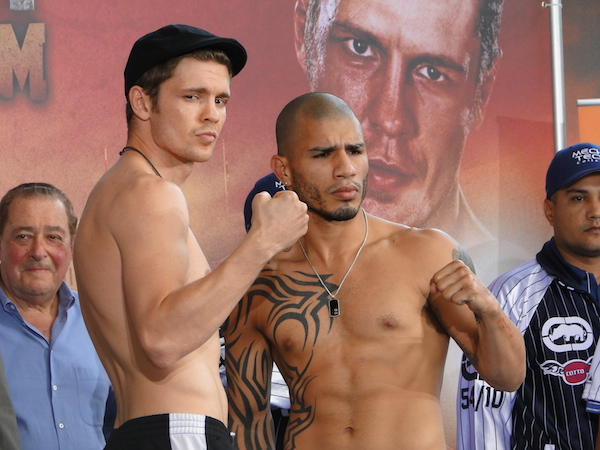Dear Sports Fan,
You’re good with words and phrases. I was watching Rachael Maddow the other day and she said she was doing a special “tale of the tape” show. What does “tale of the tape” mean? Is it some kind of sports thing?
Thanks,
Ellis
Dear Ellis,
The phrase “tale of the tape” refers to making an objective comparison, particularly between two combatants. It comes from the sport of boxing where fighters are measured and weighed before a fight.
The pre-fight measurement has an important function but it also has its share of pageantry. To make boxing reasonably fair, it is organized into weight classes. For example, the famous fight between Sugar Ray Leonard and Thomas Hearns in 1981 was fought in the welterweight category. Both fighters had to be less than 147 pounds and more than 140 pounds during the weigh-in, which is usually the night before the fight. For a professional fight, the minimum weight is usually waived, but for amateurs, it’s an important safety element. Why the obsession with weight? Assuming that most boxers are not flabby, weight translates almost directly from muscle and height into punching power. The heavyweight class, the most traditionally prestigious weight class, has no maximum weight, only a minimum of 200 pounds, and even that isn’t enforced. So why do heavyweight fights still have weigh-ins the day before? Part of the answer is that the weigh in has become an important part of hyping or developing interest for the fight. The boxers pose for promotional photos with eyes locked on each other and fists cocked. Often trash talk is exchanged. Sometimes they even come to blows, although that’s usually put to an end quickly. The other reason is that the boxers’ weight, height, and reach are important factors for people who are betting on the fight. Reach, for example, or wingspan, as it would be referred to in a non-boxing context, is important because one fighter being able to punch the other from a distance at which they cannot be punched back is a big advantage.
The word, “tape,” in the phrase, “tale of the tape” suggests that reach or height were the first measurement being referred to. After all, what else do you measure with a measuring tape? Over time, the phrase has expanded, not just to include weight, but also other semi-objective measurements like a fighter’s previous record, what championship belts they possess, as well as biographical information like where they are from. In this context, it combines making an objective comparison with simply describing the fighter. That’s likely the sense in which Rachael Maddow was using the phrase. Did she do a comparison of two candidates which included objective information about their positions as well as stories about their past?
Thanks for reading,
Ezra Fischer


